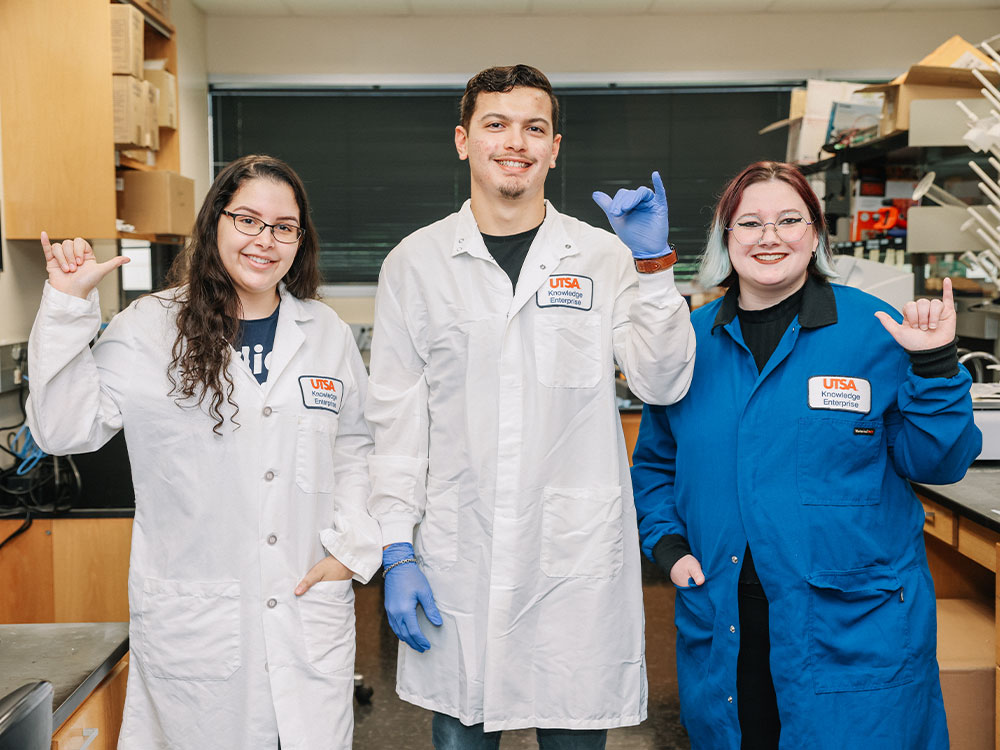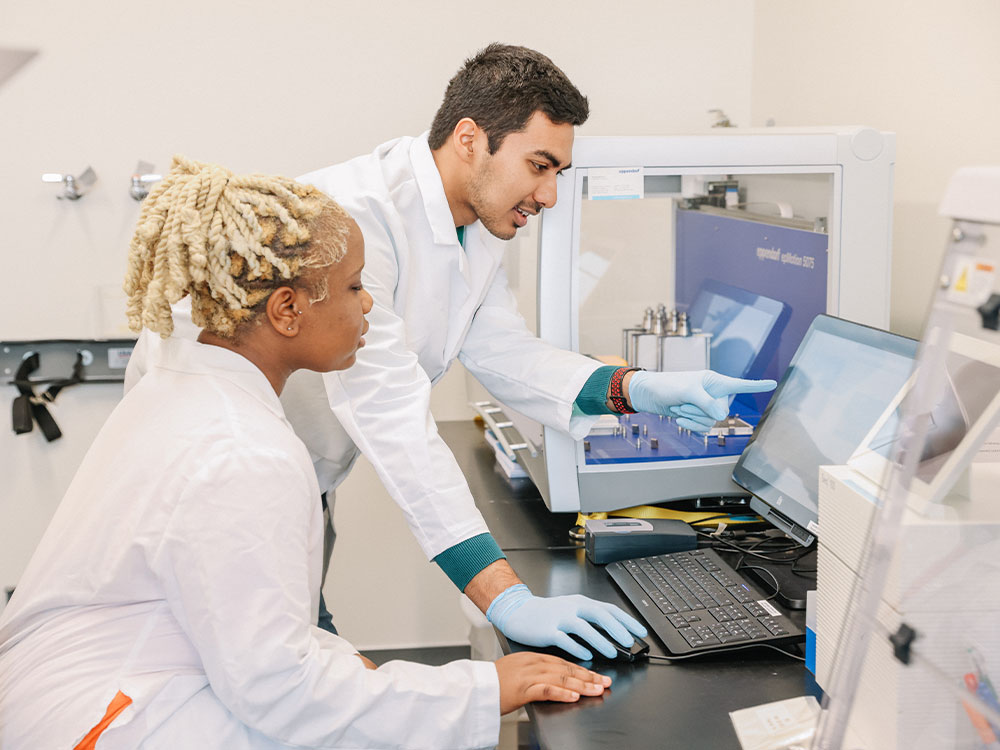
Why Pursue a PhD in Neuroscience
As a doctoral student, the first year of coursework offers a strong background in electrical and chemical signaling, brain circuits, experimental design, and data analysis. Students also complete a series of three lab rotations before beginning dissertation projects. Neuroscience students conduct original research, present their work at national and international conferences, and author articles published in prestigious scientific journals. Research is conducted in modern laboratories and well equipped supporting core facilities.

Program Highlights
- Interdisciplinary training in neuroscience research
- 30+ renowned faculty mentors in 5 major areas:
- Brain disorders
- Computational neuroscience
- Electrical signaling
- Sensory processing
- Stem cells & development
- Excellent student success with program alumni currently in academia, industry, consulting, and data science
- Students receive a competitive annual stipend and have health insurance
- Vibrant research community
Collaborative Environment
The program faculty is highly interactive and diverse with multiple opportunities for cross-lab research and mentoring. The PhD in Neuroscience is enriched by UTSA Neurosciences, which hosts annual research symposia, podcasts from world-renowned neuroscientists, and activities that promote research collaboration.
Student also have the opportunity to work collaboratively using multidisciplinary approaches to advance our basic understanding of the brain and brain disorders through the UTSA Brain Health Consortium.
Admission & Application Requirements
Applications are submitted through the UTSA Graduate Application. Please upload all required documents (listed below) on your UTSA Graduate Application. It is the applicant’s responsibility to ensure completion and submission of the application, a nonrefundable application fee, and all required supporting documents are on file with UTSA by the appropriate application deadline.
| Neuroscience (PhD) | ||
|---|---|---|
| Admission is only available for the Fall semester | ||
| Required Degree | Bachelor's Degree from an accredited college or university in the United States or have proof of equivalent training at a foreign institution. | |
| Minimum GPA | 3.0 (on a 4.0 scale) Departments may consider GPA of last 60 semester credit hours | |
| Coursework | 18 credit hours in an area related to this graduate degree and at least 12 hours must be at the upper-division level. | |
| Transcripts* | Required from all institutions attended; international transcripts must be recorded/translated to English | |
| Credential Evaluation | Required if you have earned university-level credit from foreign institutions. Submit an evaluation of your transcripts from Educational Credential Evaluators (ECE) directly from the graduate admission application platform | |
| English Language Proficiency | 550 TOEFL Paper / 79 TOEFL Internet / 6.5 IELTS / Duolingo 100 | |
| Purpose Statement | Required | |
| Letters of Recommendation | 3 academic or professional reference(s) demonstrating your attributes for successful completion of this program (you will request these through the Graduate Admissions Application; let your recommenders know of your deadline to ensure submissions are on time) | |
| *Unofficial transcripts will be taken into consideration for admissions; however, if admitted into the program, you must submit official transcripts to the University. | ||
Application Deadlines
Applicants are encouraged to have their admission file completed as early as possible. All applications, required documents and letters of recommendation, if applicable, must be submitted by 5:00 PM U.S. Central Time on the day of the deadline. Deadlines are subject to change.
| Neuroscience (PhD) | |||
|---|---|---|---|
| Timing on Admission Decision: Completed applications will be reviewed for admission after the deadlines below. Decisions will be made and sent to applicants within a few weeks after the review date. | |||
| Application Deadlines for: | Priority | International | Domestic |
| Fall 2024 | December 1 | December 1 | |
| Spring | Not Available | Not Available | |
| Summer | Not Available | Not Available | |
Funding Opportunities
The department offers competitive stipend support throughout a student’s tenure in the program. In addition, all tuition and fees will be paid. Entering students are encouraged to apply for National Science Foundation as well as National Institutes of Health pre-doctoral fellowship support. For qualified students, the Minority Biomedical Research Support Program supports stipend, tuition and fees, health insurance, and travel to scientific meetings.
Career Options
UTSA prepares you for future careers that are in demand. The possible careers below is data pulled by a third-party tool called Emsi, which pulls information from sources like the U.S. Bureau of Labor Statistics, U.S. Census Bureau, online job postings, other government databases and more to give you regional and national career outlook related to this academic program.
While in a doctoral program, a student may earn a master’s degree provided the following conditions are satisfied:
- A student must be admitted to candidacy.
- A student is eligible to receive a master’s degree upon completion of University-wide requirements and any additional degree requirements specific to the program.
- The Doctoral Studies Committee, Department Chair, and the Graduate Associate Dean of the College must recommend students for the degree.
- The student must apply for graduation by the published deadline the semester prior to awarding the doctoral degree.
- All required coursework in the doctoral program at the time of admission to candidacy must have been taken within the previous six years.
- If the master’s degree requires a thesis, the degree cannot be awarded on the basis of the doctoral qualifying examination.
- Students will not be approved for an additional master’s degree in the same field in which an individual has previously received a master’s degree.
This program is housed on UTSA’s Main Campus. Courses and research activities are primarily offered during the day, but participation in the neuroscience PhD program is considered a full-time activity.


